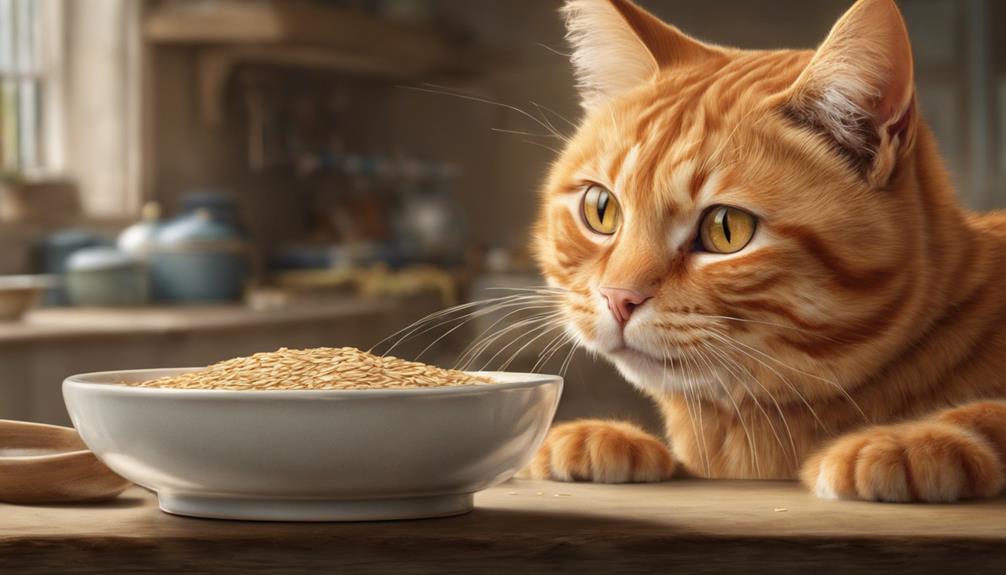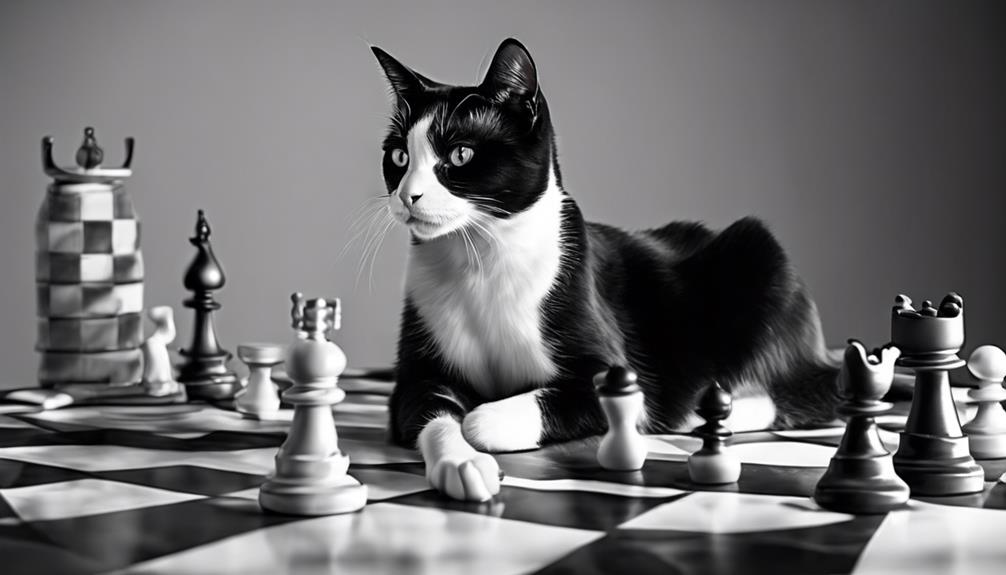Cats definitely miss their owners! They may exhibit signs such as increased purring, seeking affection, or appearing stressed. Look out for behaviors like excessive meowing or furniture scratching. Cats can demonstrate separation anxiety through changes in appetite or being lethargic. To aid in comforting them, try offering interactive toys, maintaining routines, and providing affection. Petting, playing, or simply talking to them can alleviate their feelings. If you’re interested in learning more about how to comfort your cat and understand their emotions, there are helpful strategies to establish a loving bond and ensure their well-being.
Key Takeaways
- Cats do miss their owners and show signs of longing and affection.
- Behavioral indicators like extra purring and seeking attention suggest missing their owners.
- Cats can experience separation anxiety and stress when apart from their owners.
- Providing comfort, affection, and familiar scents can help cats cope with missing owners.
- Understanding feline emotional expressions and addressing their needs is crucial for comforting absent cats.
Signs of Cat Missing Owner
Noticing signs of a cat missing their owner can provide valuable insights into the bond between feline and human. Cats are creatures of habit and attachment, so when they miss their owners, it often shows in their behavior. Extra purring and stretching upon reunion are common indicators that a cat has been longing for their owner's return. The joy and relief they express through these actions speak volumes about the depth of their connection.
Furthermore, a strong desire for affection and attention when the owner comes back is another clear sign of how much a cat misses their human. This longing can sometimes manifest as agitation, stress, or out-of-character behavior upon the owner's return. Destructive behaviors like scratching furniture or excessive meowing may also be cries for attention and comfort. In extreme cases, physical illness such as refusing to eat or excessive grooming can be a poignant sign that a cat truly missed its owner. It's remarkable how these subtle cues can reveal the profound impact of human companionship on our feline friends.
Feline Emotional Expressions

Felines demonstrate a range of emotions through subtle cues and behaviors, underscoring their unique ways of communicating with their owners. Cats may not wear their hearts on their sleeves like humans, but they have their own language of emotional expressions. Understanding these signs can help us connect better with our furry friends and address their needs effectively.
| Emotion | Signs |
|---|---|
| Joy | Kneading, purring |
| Stress | Hiding, excessive grooming |
| Fear | Hissing, flattened ears |
| Affection | Head bunting, slow blinking |
| Separation Anxiety | Excessive meowing, destructive behavior |
When cats experience separation anxiety, they might excessively meow or exhibit destructive behaviors. Recognizing these emotional expressions is crucial to providing comfort and support to our feline companions. By observing their subtle cues, we can nurture a deeper understanding of our cats' emotions and strengthen the bond we share with them.
Understanding Cat Longing

When it comes to understanding cat longing, it's crucial to acknowledge the deep bond that can exist between cats and their owners.
Signs of missing their owners, such as purring, kneading, and seeking affection, can indicate a cat's longing for their human companion.
Comforting absent cats and being mindful of their emotional needs can help alleviate separation anxiety and strengthen the connection between cats and their owners.
Cat Owner Bond
Understanding the strong social bond between cats and their owners is essential in recognizing and addressing cat longing.
- Cats can experience feline separation and signs of separation anxiety when their owners are away.
- Signs of a cat missing its owner may include elaborate greetings, following behavior, and seeking comfort in familiar scents.
- Helping your cat cope with missing you involves creating a loving environment, providing engaging activities, and ensuring their comfort.
Signs of Missing
In recognizing signs of missing their owners, cats may exhibit various behaviors that indicate their longing and emotional distress. Signs Your Cat Missed you may include extra purring, seeking intense affection, or showing agitation and stress.
When our feline friends engage in destructive behaviors like scratching furniture or excessive grooming, it could be a clear sign of separation anxiety and missing their human companions. Additionally, physical sickness, such as changes in eating habits or litter box issues, can be extreme indicators of a cat missing their owner.
It's important to pay attention to these behaviors as they reveal the depth of our cats' emotional attachment and their need for our presence and care.
Comforting Absent Cats
Cats communicate their longing for their owners through various behaviors such as extra purring and seeking intense affection. When comforting absent cats, it's important to understand their separation anxiety and signs that your cat may show when missing you.
Here are some ways to help your furry friend feel more at ease:
- Extra Purring and Stretching: Cats may exhibit increased purring and stretching when they miss their owners, seeking comfort through these behaviors.
- Seeking Intensive Affection: Cats often crave more attention and affection when their owners are away, expressing their longing through seeking intense cuddles and pets.
- Monitoring for Physical Illness: In extreme cases, physical illness can manifest in cats experiencing distress from missing their owners, highlighting the importance of monitoring their health during separations.
Behavioral Clues of Missing Owner
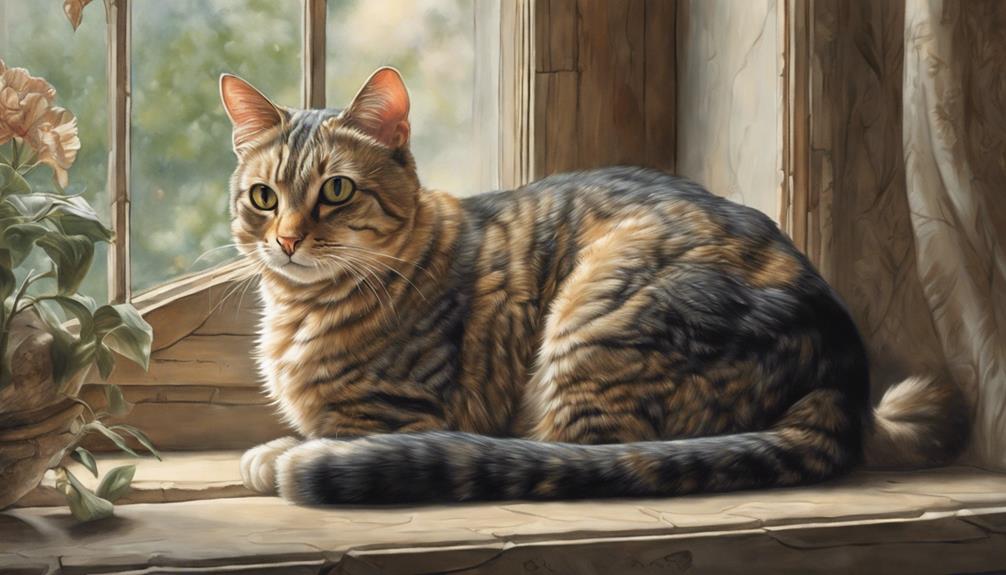
Upon reuniting with their owner, cats often display behavioral clues that suggest they missed them, such as extra purring and stretching. These signs of happiness are heartwarming indicators that your feline friend truly missed you while you were away.
When you return home, your cat may show a strong desire for affection and attention, seeking to interact with you more than usual. However, it's crucial to pay attention to other behaviors that may signal your cat missing you in a less obvious way.
Agitation or stress behaviors like excessive meowing could be your cat's way of expressing their longing for your presence. Destructive actions such as scratching furniture or aggression might also stem from the stress of missing their beloved owner.
In more severe cases, physical illness like loss of appetite or lethargy could be extreme signs that your cat is experiencing distress from your absence. By being attuned to these behavioral clues, you can better understand and comfort your cat when they miss you.
Reasons Cats Miss Owners
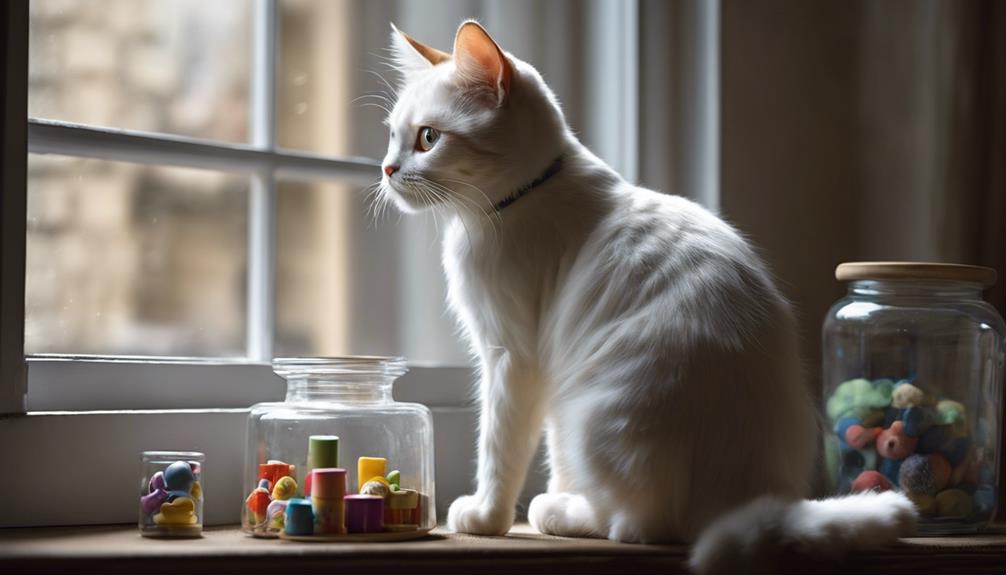
After spending significant time together, cats form strong social bonds with their owners, which can lead to feelings of longing and attachment when separated. Cats may miss their owners for various reasons, including:
- Separation Anxiety: Cats can experience separation anxiety when apart from their owners for extended periods, showing signs of distress and restlessness.
- Fear of Abandonment: The fear of being left alone or abandoned can cause cats to miss their owners, seeking comfort and security in their presence.
- Relocation Stress: Changes in environment or routines, such as moving to a new home, can trigger stress in cats, leading them to miss their owners as a source of familiarity and safety.
These reasons highlight the deep emotional connections that cats can develop with their owners, emphasizing the importance of understanding and addressing their needs for comfort and security during times of separation.
Recognizing Cat Longing

Recognizing signs of cat longing can deepen the understanding of our feline companions' emotional needs and strengthen the bond between us. Cats experiencing separation anxiety may exhibit behaviors that indicate they are missing their owners. Some signs of missing include excessive purring, seeking affection more than usual, and displaying altered routines. Increased vocalization, agitation, or destructive behavior can be cries for attention and comfort. Cats might also show physical symptoms of distress, like excessive grooming or changes in appetite when longing for their owners. Seeking solace in familiar scents, such as sleeping on their owner's clothes, can provide cats with a sense of security during these times. By recognizing these signs and responding with love and care, we can help alleviate their longing and reassure them of our presence even when we're apart.
| Signs of Missing | Examples |
|---|---|
| Excessive purring | Purring more frequently |
| Seeking affection | Demanding more cuddles |
| Altered routines | Changes in eating patterns |
How Cats Show Affection

Cats express their affection through various behaviors that signify their bond with their owners. When your feline friend purrs softly while cuddled up next to you, it's a clear sign of contentment and happiness. Head-butting may seem odd, but it's actually a sweet gesture showing trust and a desire to bond with you.
Additionally, the act of slow blinking from your cat isn't just a sleepy gesture; it's a way for them to show their trust and relaxation in your presence.
These behaviors are all ways in which your cat is saying, 'I love you' in their own unique language. So, the next time your cat kneads your lap, purrs in your ear, or head-butts you gently, know that it's their way of showing affection and strengthening the special connection they've with you.
Emotional Responses in Cats
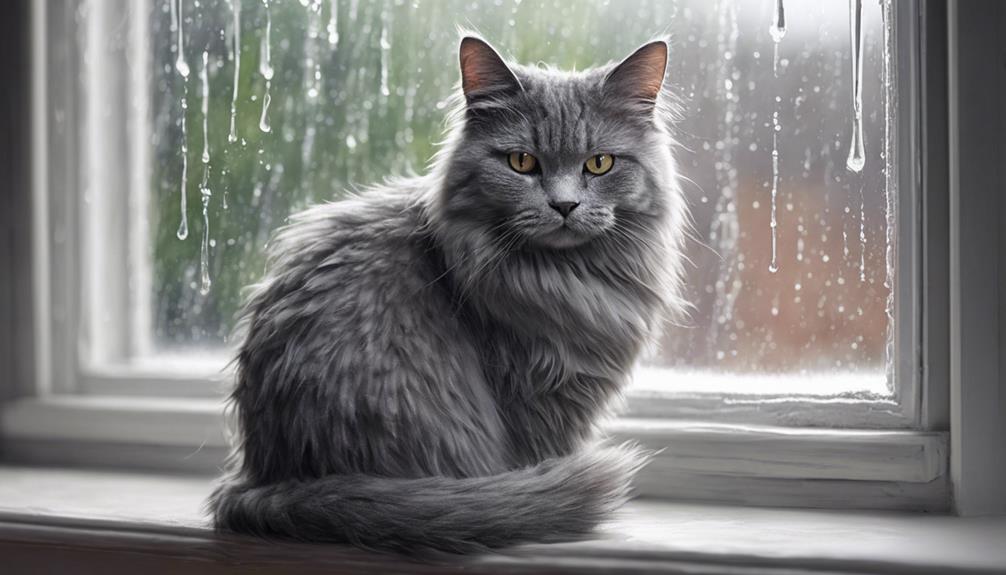
When observing cats' emotional responses, it becomes evident that these feline companions can form deep connections with their owners, exhibiting a range of feelings from stress to joy.
Cats, known for their independent nature, also have a significance for forming strong emotional bonds with their human caregivers. Signs of distress, such as excessive grooming or hiding, can be indicators that a cat misses their owner. Conversely, moments of joy are seen through behaviors like purring, seeking comfort in your scent, or playful interactions.
Understanding feline emotions is vital in nurturing these relationships. Recognizing the signs of attachment allows us to respond appropriately and strengthen the bond we share with our furry friends. Cats can remember their owners even after prolonged separations, showcasing the lasting impact of these emotional connections.
Coping With Cat Separation
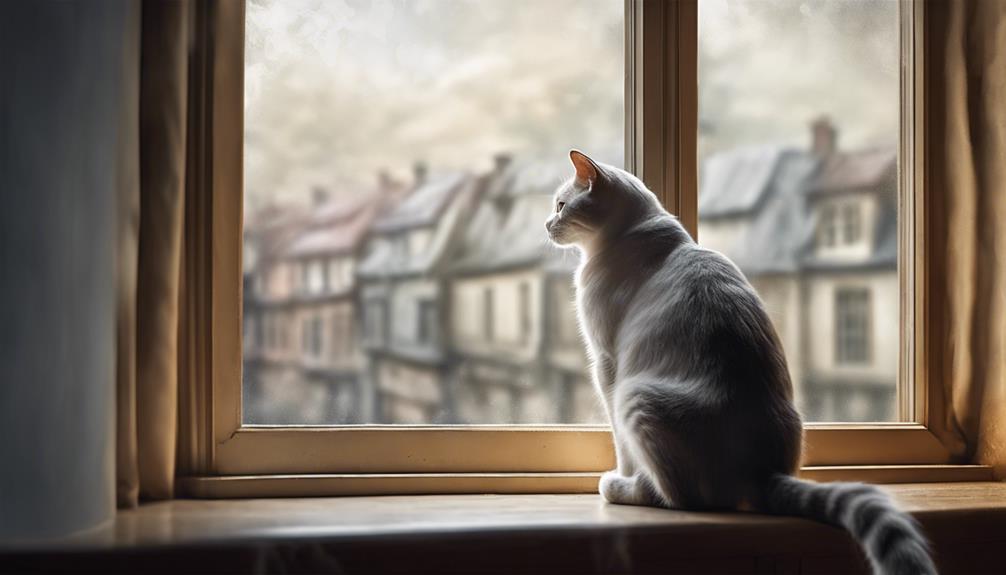
To manage cat separation effectively, make sure your furry friend's environment is enriched and their needs are met before you depart. Here are some practical tips to help your cat cope with your absence:
- Provide interactive toys and scratching posts: These items can keep your cat entertained and mentally stimulated while you're away, helping to alleviate separation anxiety.
- Consider hiring a cat-sitter: A cat-sitter can offer interaction and companionship for your cat in your absence, providing reassurance and care while you're not around.
- Maintain a consistent routine: Following a consistent schedule can help reduce your cat's anxiety and make them feel more secure. Ensure their feeding times, playtimes, and other activities are kept as consistent as possible.
Identifying Cat Yearning

Feeling a sense of emptiness or longing, our feline companions can subtly communicate their yearning for us through various behaviors. When we're away, signs of missing can manifest in ways like extra purring and stretching. As we return, an increased desire for affection and attention may indicate that our cat truly missed us.
However, it's important to be attentive to other behaviors that could signal separation anxiety. For instance, agitation or stress upon our return might suggest that our cat experienced distress during our absence. Destructive behavior, such as scratching furniture or urinating outside the litter box, could also be signs of our cat missing us. In more extreme cases, physical illness in our cat might be a manifestation of the distress they feel from our separation.
Behavioral Indicators of Missing

Noticing behavioral indicators of missing in cats can provide valuable insights into their emotional state when separated from their owners. When our feline friends are missing us, they may exhibit the following behaviors:
- Increased Affection: Cats might seek more attention and display affectionate behaviors like head butting and rubbing against objects to feel closer to their owners.
- Excessive Grooming: Cats may engage in excessive grooming as a coping mechanism for their stress and anxiety from missing their owners, leading to bald patches or skin irritation.
- Destructive Behavior: When feeling lonely or stressed, cats may resort to destructive behaviors like scratching furniture or curtains, which can be a cry for attention and a way to alleviate their feelings of separation.
Observing these signs can help us understand and address the emotional needs of our cats when we're away. Providing them with comfort, reassurance, and maybe even a familiar scent is crucial to help them feel secure in our absence.
Bond Between Cats and Owners
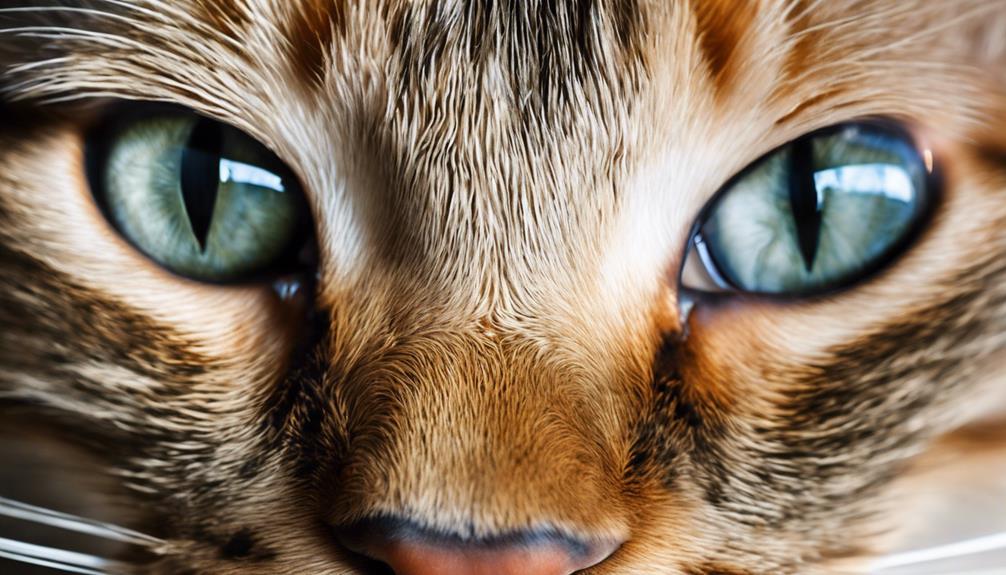
Cats form deep emotional attachments with their owners, often seeking out their presence for comfort and security. Recognizing their owners through scent and sight, cats display affection in various ways, such as head bunting or softly kneading their paws.
Emotional Attachment Between Cats
Forming strong emotional bonds with their owners, cats exhibit behaviors like kneading, purring, and seeking physical contact to express their deep attachment. Cats can display signs of separation anxiety when apart from their beloved humans. They may meow more frequently, become listless, or even exhibit destructive behavior.
Understanding these signs is important in nurturing the bond and providing comfort to our feline companions. Spending quality time together and engaging in interactive play sessions can strengthen the emotional connection between cats and their owners. This bond not only brings joy and companionship but also fosters a sense of security for our furry friends, ensuring they feel loved and cherished in their forever homes.
Recognizing Owners Presence
When we come into the room, our feline friends may subtly adjust their posture or gaze, showing their awareness of our presence through small, yet telling cues.
Cats have a remarkable ability to recognize their owners' presence through scent, appearance, and even the sound of their voice, forging a strong bond between them.
Research indicates that cats display signs of missing their owners when they're away, through behaviors like vocalizations and changes in their routine.
This bond between cats and owners often leads to cats seeking comfort and security from their human companions in times of distress or uncertainty.
Expressing Affection Towards Owners
In nurturing the bond between feline companions and their owners, expressions of affection manifest through various behaviors such as purring, head-butting, and kneading. When cats show these signs of affection, they're strengthening the emotional connection they've with their owners.
This bond deepens through consistent interaction and quality time spent together. Understanding how cats express their love can greatly enhance the relationship between owners and their feline friends.
Addressing Cats Emotional Needs

To guarantee the well-being of our feline companions, it's essential to address their emotional needs by acknowledging and responding to their unique behaviors and cues. Cats can experience separation anxiety and miss their owners, feeling safe and comforted when their humans are around. Relocation stress and the fear of abandonment can also contribute to these feelings of longing. It's important to keep a close eye on our cats for signs that they might be missing us, such as increased purring, kneading, or seeking extra physical contact.
Understanding and recognizing these emotional needs are critical in fostering a strong bond with our cats. By providing a loving and secure environment, we can help alleviate their anxiety and make sure they feel safe and content. Paying attention to their cues and responding with affection and care can go a long way in addressing their emotional well-being. Remember, our feline friends rely on us to meet their emotional needs and provide them with the comfort and security they seek.
Cats Desire for Attention
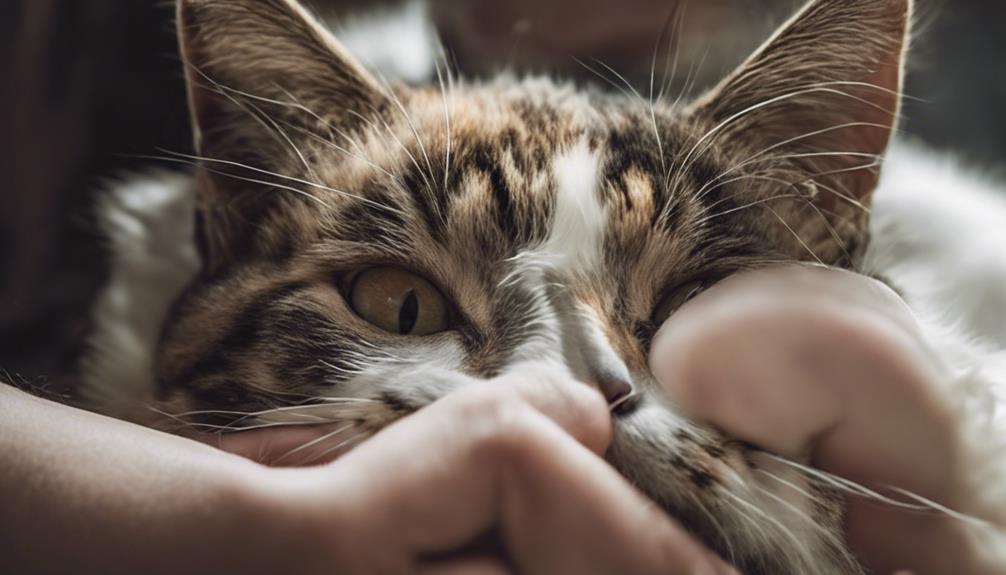
Acknowledging and responding to cats' unique behaviors and cues is essential in understanding their desire for attention from their owners. Cats, like us, crave affection and companionship, and their ways of seeking attention can be quite endearing. Here are some key behaviors that indicate a cat's desire for attention:
- Rubbing Against You: When a cat rubs against you, they aren't just marking their territory; they're also seeking your attention and affection.
- Purring and Meowing: Cats use purring and meowing as ways to communicate their need for attention and companionship. Responding to these vocalizations is vital for strengthening your bond.
- Following You Around: Cats may follow their owners around the house to seek attention and be close to them. This behavior shows their desire for your presence and companionship.
When you notice signs of happiness like kneading and slow blinking, remember that your cat is expressing their desire for attention and affection. Engaging in interactive play and responding positively to physical touch are ways to fulfill their need for attention and nurture a happy, content feline companion.
Dealing With Cats Longing

Providing interactive toys and scratching posts can effectively alleviate your cat's longing for your companionship. These toys engage your feline friend, keeping them entertained and mentally stimulated in your absence. Additionally, leaving out familiar belongings like blankets or clothing with your scent can help reduce separation anxiety, providing comfort and reassurance to your cat.
If you're frequently away from home, hiring a cat-sitter can be a valuable solution to ease your cat's longing for you. A caring individual can offer companionship, playtime, and guarantee your cat's well-being while you're gone.
Maintaining a consistent routine and environment is essential for your cat's security and emotional well-being. Enriching their surroundings with perches, cat trees, and cozy spots can provide entertainment and comfort, reducing their yearning for your presence.
Frequently Asked Questions
Do Cats Miss Their Owners if They Are Given Away?
When cats are given away, they may miss their owners due to strong emotional bonds formed. Signs like excessive grooming or hiding can indicate their distress. Providing a loving environment helps them cope with separation anxiety and feelings of loss.
How Do You Know That Your Cat Has Missed You?
When your cat has missed you, they may show it through extra purring, stretching, seeking affection, or displaying stress. Destructive behavior like scratching or excessive meowing can also be signs of longing.
Do Cats Get Sad When You Leave?
When we leave, our cats can get sad. They may show signs of distress through behaviors like extra purring or seeking comfort. Providing interactive toys and maintaining a consistent routine can help alleviate separation anxiety in our feline friends.
How Long Before a Cat Forgets Its Owner?
With time, a cat may forget its owner. This memory loss varies based on bond strength. Signs of forgetting include decreased recognition cues. Cats form deep connections, making it challenging for them to forget us quickly.
Does My Cat Following Me to the Bathroom Mean It Misses Me?
Some cats following to bathroom may simply be curious about your activities. Others may feel a need to be close to you, even in the bathroom. It might not necessarily indicate that your cat misses you, but rather sees you as a source of comfort and security.
Conclusion
To sum up, cats can indeed miss their owners. Just like the saying goes, 'absence makes the heart grow fonder.'
It's crucial for cat owners to recognize the signs of their feline friends missing them and to cater to their emotional needs.
By grasping the bond between cats and their owners, providing attention, and addressing their longing, we can guarantee that our beloved pets feel loved and cared for even when we're not around.




